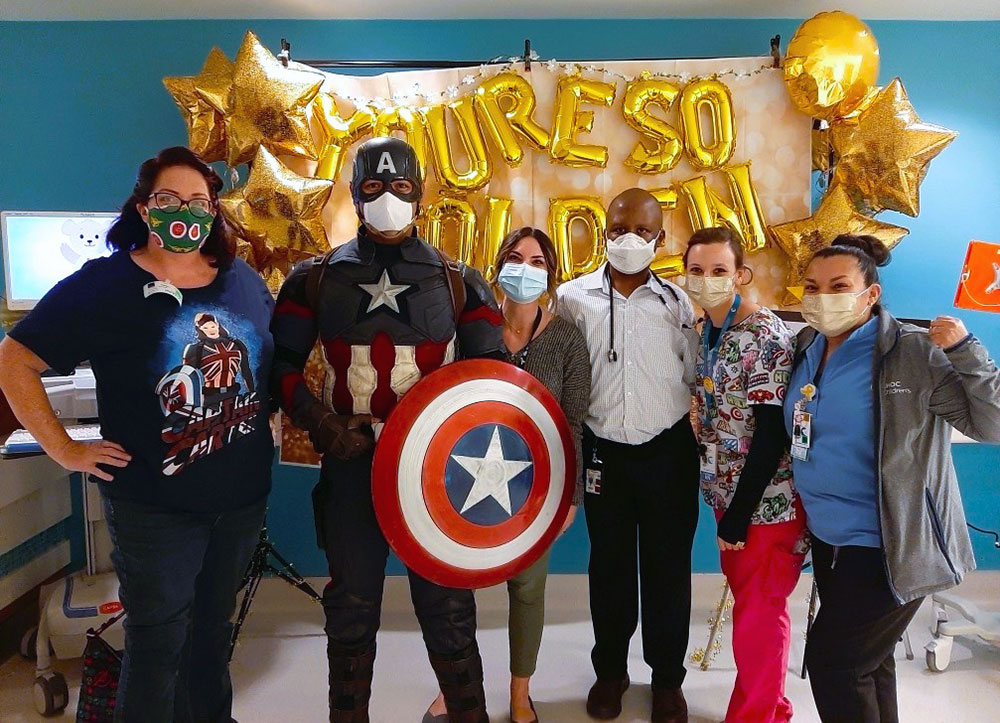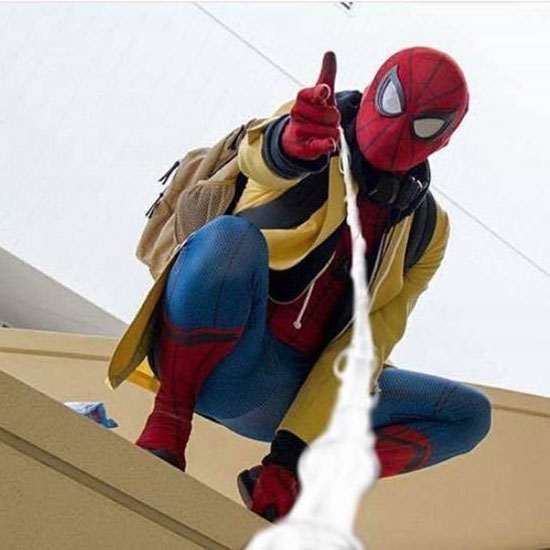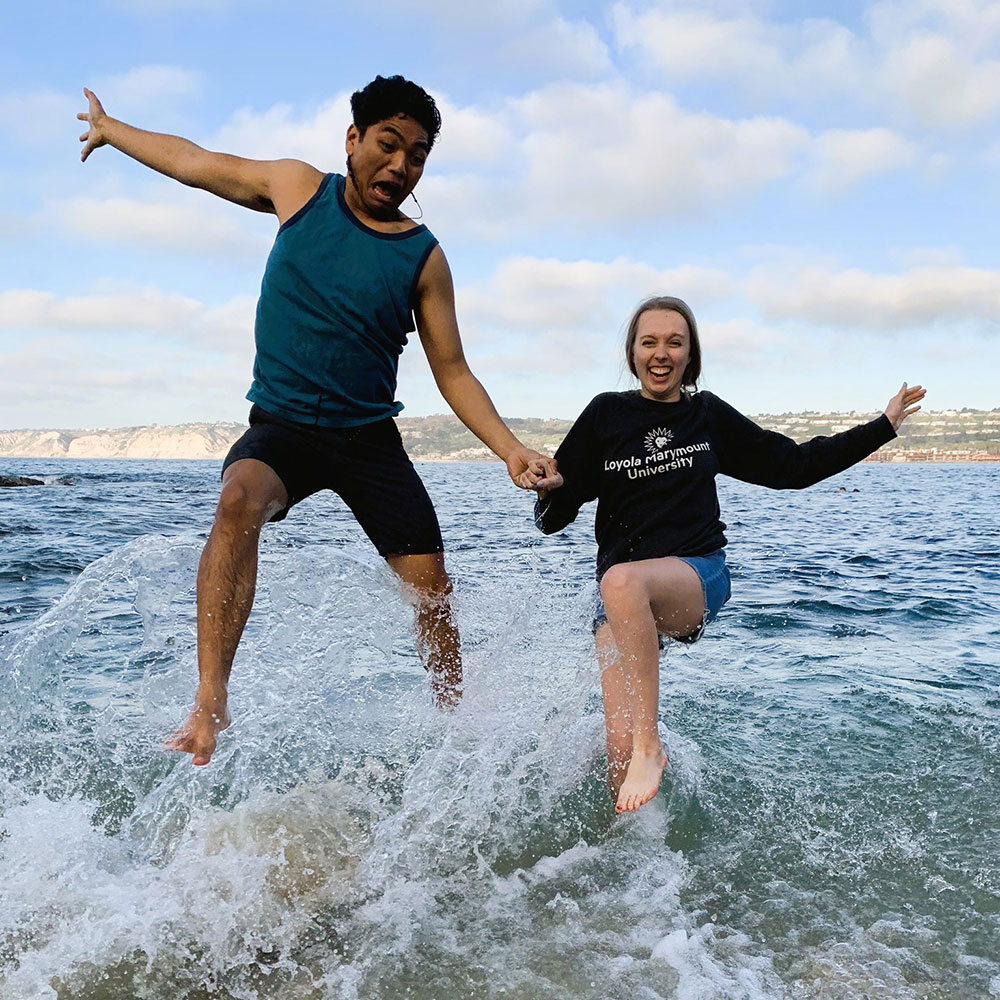 Er as Captain America (his favorite self-created costume so far) at a children's hospital visit.John Ermanuel Bautista, who will turn 26 in June, was nervous when he walked into the young patient’s room. Staff at the children’s hospital had told him the girl with the shunt was withdrawn. She didn’t want to talk to the nurses or doctors and was having a hard time eating and standing.
Er as Captain America (his favorite self-created costume so far) at a children's hospital visit.John Ermanuel Bautista, who will turn 26 in June, was nervous when he walked into the young patient’s room. Staff at the children’s hospital had told him the girl with the shunt was withdrawn. She didn’t want to talk to the nurses or doctors and was having a hard time eating and standing.
It was the first time Bautista had visited a patient wearing his screen-accurate Captain American costume, into which he’d put many hours of build time. He made the visit as part of the West Coast chapter of the Avengers Initiative, a cosplay group of Marvel Comic fans based in the Los Angeles area. Its mission includes volunteering in the local community—the group calls this “Causeplay.”
The hospital had just eased its COVID-19 restrictions, and the patient (around 10, says Bautista) hadn’t yet had this kind visit that can make hospitalized children smile and give them time when they can just be regular kids. “I walked in, and her eyes lit up,” says Bautista, who prefers to be called be called “Er” (pronounced “E. R.”), a nickname he’s had since the third grade
“She started telling me all her opinions about Marvel characters and TV shows. She was the most talkative the nurses and doctors had ever seen her, and I was able to get her to stand because she wanted to hold my [Captain America] shields,” he says.
That experience gave Bautista an insight that would help shape his future.
“I realized I can have an impact on people, whether it’s through the career in occupational therapy I hoped to pursue, or in my off time, when I like to dress up as fun onscreen characters,” he says.
During the interview for this profile, Bautista also talked about his Filipino heritage, his love of arts and crafts, and a childhood experience with an OT, all of which came together to lead him to the career he’s working toward at UAB.
Our conversation has been lightly edited for clarity and length.
 Er in action as Spiderman.Please tell me a bit about your background and where you’re from.
Er in action as Spiderman.Please tell me a bit about your background and where you’re from.
I'm from Eagle Rock, a smaller neighborhood in Los Angeles. It's got a really tight Filipino community. My parents emigrated from the Philippines in the 90s and had me not long after. Growing up in the close-knit Filipino community of Eagle Rock provided my family and me with a lot of familiar comforts. What I recall the most was the vast amount of Filipino food my community had to offer.
On long workdays when my parents didn't have time to cook or grocery shop, I remember going down to this take-out spot called Nanay Gloria's. We’d grab a few take-out boxes of delicious house-made Filipino food entrees and take them home, where we had white rice ready. Some mornings we would swing by the bakery that baked fresh pandesal, a slightly sweet Filipino breakfast roll, and eat them in the car while they were still warm.
I think this really shaped my palette as an adult and, despite not growing up in the Philippines, I feel like it brought me closer to my culture as a Filipino-American.
How did you decide on a career in occupational therapy?
As an undergraduate I worked as a rehab aide at a skilled nursing facility. I was working closely with occupational therapists (OTs), and I heard them say things to their clients like, “Hey, do you like coloring” or “We should paint or play a board game or a puzzle.” It was tailored to each patient’s interests, and I found that really interesting.
The OTs also focused on fine motor skills and, being artsy and crafty myself, I really value my hands and those skills—and my ability to express myself creatively [in many mediums]. When I found out OTs use lots of diverse, creative approaches, that just drew me in.
Occupational therapy had also made a personal impact on my life. As a child I had issues with pencil grip, and my handwriting was terrible. I worked with an OT on fine motor skills and eventually became somebody who is proud of those skills. I can't imagine not having them now—it’s such a big part of my personality. And I can't wait to have the opportunity to provide that kind of care.
How did you choose UAB for your OTD degree?
I'm really interested in pediatrics, and UAB’s program offers good opportunities to work with kids—and I really like the like Magic Camp focus. The program also feels way more hands on than other programs I looked at, and Dr. Jenkins and Mr. Vice told me [when I interviewed with them] that the fieldwork is pretty flexible. And those things just got me.
 Er is startled by a wave at La Jolla Beach in San Diego while his wife, Margaret Sills (she goes by Maggie), remains cool. How did you get into cosplay?
Er is startled by a wave at La Jolla Beach in San Diego while his wife, Margaret Sills (she goes by Maggie), remains cool. How did you get into cosplay?
As a kid, I was really into comic books. Later, the big movies [based on comics] started coming out and every character you see up there is incredible. I was young when I went to my first convention and decided to start dressing up. I started [learning to create costumes] by going to Goodwill and buying pants and shirts and cutting them for a character.
It takes time [to learn], but I've been doing it for almost 10 years now. I taught myself how to sew, to do hand stitching and leather crafting. I learned to work with heat guns and different materials like thermoplastics. Coming from LA, I also had the opportunity to meet [professional] costume creators and talk to them about their process.
Cosplay connects you to [others who share your interest] and you can hang out together in costume and volunteer. I've already done a couple volunteer opportunities in Birmingham in costume. I did one for a convention that was donating funds to a children's hospital. We’d stand in a circle and people would give us a dollar so they could shoot us with a Nerf gun.
For me it all came together, combining crafting and costuming and my love of helping other people.
What else would you like the department’s students, faculty, staff to know about you?
I'm very friendly and open to making friends. I've lived in California my whole life, all of my lifelong friends are there, and I was kind of anxious about meeting people. I am kind of reserved, so it's been hard reaching out to people and being like, hey, let's be friends.
I love surfing, archery, and boxing. I really like these solo, almost combat sports. I do sword fighting called HEMA, or Historical European Martial Arts. I have a lot of hobbies, anything that I can try that’s hands on, which I think feeds well into me becoming an occupational therapist. I feel like being able to understand different sports and hobbies and occupations can help me help other people.